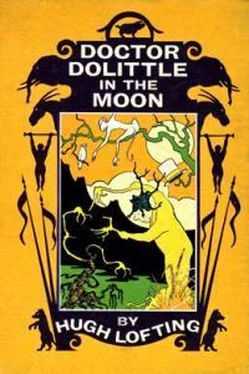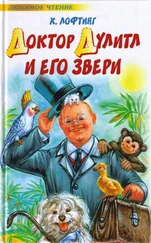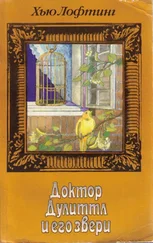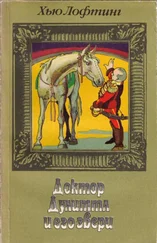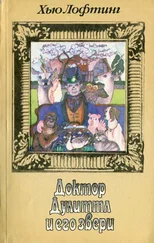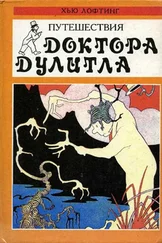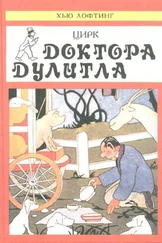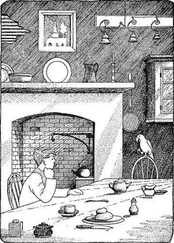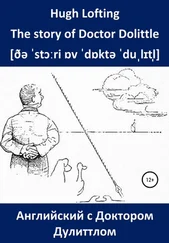Хью Лофтинг - Doctor Dolittle in the Moon
Здесь есть возможность читать онлайн «Хью Лофтинг - Doctor Dolittle in the Moon» весь текст электронной книги совершенно бесплатно (целиком полную версию без сокращений). В некоторых случаях можно слушать аудио, скачать через торрент в формате fb2 и присутствует краткое содержание. Год выпуска: 2014, Издательство: epubBooks Classics, Жанр: Сказка, на английском языке. Описание произведения, (предисловие) а так же отзывы посетителей доступны на портале библиотеки ЛибКат.
- Название:Doctor Dolittle in the Moon
- Автор:
- Издательство:epubBooks Classics
- Жанр:
- Год:2014
- ISBN:нет данных
- Рейтинг книги:5 / 5. Голосов: 1
-
Избранное:Добавить в избранное
- Отзывы:
-
Ваша оценка:
- 100
- 1
- 2
- 3
- 4
- 5
Doctor Dolittle in the Moon: краткое содержание, описание и аннотация
Предлагаем к чтению аннотацию, описание, краткое содержание или предисловие (зависит от того, что написал сам автор книги «Doctor Dolittle in the Moon»). Если вы не нашли необходимую информацию о книге — напишите в комментариях, мы постараемся отыскать её.
Doctor Dolittle in the Moon — читать онлайн бесплатно полную книгу (весь текст) целиком
Ниже представлен текст книги, разбитый по страницам. Система сохранения места последней прочитанной страницы, позволяет с удобством читать онлайн бесплатно книгу «Doctor Dolittle in the Moon», без необходимости каждый раз заново искать на чём Вы остановились. Поставьте закладку, и сможете в любой момент перейти на страницу, на которой закончили чтение.
Интервал:
Закладка:
"Spellbound, we gazed up at them"
Of course, as the Doctor remarked, unless the wind had always blown steadily and evenly such a thing would have been impossible. John Dolittle himself was most anxious to find out on what scale of music they were working. To me, I must confess, it sounded just mildly pleasant. There was a time: I could hear that. And some whole phrases repeated once in a while, but not often. For the most part the melody was wild, sad and strange. But even to my uneducated ear it was beyond all question a quite clear effort at orchestration; there were certainly treble voices and bass voices and the combination was sweet and agreeable.
I was excited enough myself, but the Doctor was worked up to a pitch of interest such as I have seldom seen in him.
"Why, Stubbins," said he, "do you realize what this means?—It's terrific. If these trees can sing, a choir understands one another and all that, they must have a language .—They can talk! A language in the Vegetable Kingdom! We must get after it. Who knows? I may yet learn it myself. Stubbins, this is a great day!"
And so, as usual on such occasions, the good man's enthusiasm just carried him away bodily. For days, often without food, often without sleep, he pursued this new study. And at his heels I trotted with my note book always ready—though, to be sure, he put in far more work than I did because frequently when we got home he would go on wrestling for hours over the notes or new apparatus he was building, by which he hoped to learn the language of the trees.
You will remember that even before we left the Earth John Dolittle had mentioned the possibility of the moon bells having some means of communicating with one another. That they could move, within the limits of their fixed position, had been fully established. To that we had grown so used and accustomed that we no longer thought anything of it. The Doctor had in fact wondered if this might possibly be a means of conversation in itself—the movement of limbs and twigs and leaves, something like a flag signal code. And for quite a long while he sat watching certain trees and shrubs to see if they used this method for talking between themselves.
"For quite a long while he sat watching certain shrubs"
9
The Study of Plant Languages
About this time there was one person whom both the Doctor and I were continually reminded of, and continually wishing for, and that was Long Arrow, the Indian naturalist whom we had met in Spidermonkey Island. To be sure, he had never admitted to the Doctor that he had had speech with plant life. But his knowledge of botany and the natural history of the Vegetable Kingdom was of such a curious kind we felt that here he would have been of great help to us. Long Arrow, the son of Golden Arrow, never booked a scientific note in his life. How would he—when he was unable to write? Just the same he could tell you why a certain coloured bee visited a certain coloured flower; why that moth chose that shrub to lay its eggs in; why this particular grub attacked the roots of this kind of water plant.
Often of an evening the Doctor and I would speak of him, wondering where he was and what he was doing. When we sailed away from Spidermonkey Island he was left behind. But that would not mean he stayed there. A natural–born tramp who rejoiced in defying the elements and the so–called laws of Nature, he could be looked for anywhere in the two American continents.
And again, the Doctor would often refer to my parents. He evidently had a very guilty feeling about them—despite the fact that it was no fault of his that I had stowed away aboard the moth that brought us here. A million and one things filled his mind these days, of course; but whenever there was a let–down, a gap, in the stream of his scientific inquiry, he would come back to the subject.
"Stubbins," he'd say, "you shouldn't have come…. Yes, yes, I know, you did it for me. But Jacob, your father—and your mother too—they must be fretting themselves sick about your disappearance. And I am responsible…. Well, we can't do anything about that now, I suppose. Let's get on with the work."
And then he'd plunge ahead into some new subject and the matter would be dropped—till it bothered him again.
Throughout all our investigations of the Moon's Vegetable Kingdom we could not get away from the idea that the animal life was still, for some unknown reason, steering clear of us. By night, when we were settling down to sleep, we'd often get the impression that huge moths, butterflies or beetles were flying or crawling near us.
We made quite sure of this once or twice by jumping out of our beds and seeing a giant shadow disappear into the gloom. Yet never could we get near enough to distinguish what the creatures were before they escaped beyond the range of sight. But that they had come—whatever they were—to keep an eye on us seemed quite certain. Also that all of them were winged. The Doctor had a theory that the lighter gravity of the Moon had encouraged the development of wings to a much greater extent than it had on the Earth.
"Seeing a giant shadow disappear into the gloom"
And again those tracks of the strange Giant Man. They were always turning up in the most unexpected places; I believe that if the Doctor had allowed Polynesia and Chee–Chee complete liberty to follow them that the enormous Human would have been run down in a very short time. But John Dolittle seemed still anxious to keep his family together. I imagine that with his curiously good instinctive judgment he feared an attempt to separate us. And in any case of course both Chee–Chee and Polynesia were quite invaluable in a tight place. They were neither of them heavy–weight fighters, it is true; but their usefulness as scouts and guides was enormous. I have often heard John Dolittle say that he would sooner have that monkey or the parrot Polynesia with him in savage countries than he would the escort of a dozen regiments.
With some of our experimental work we wandered off long distances into the heath lands to see what we could do with the gorgeous flowering shrubs that thronged the rolling downs; and often we followed the streams many miles to study the gigantic lilies that swayed their stately heads over the sedgy banks.
And little by little our very arduous labours began to be repaid.
I was quite astonished when I came to realize how well the Doctor had prepared for this expedition. Shortly after he decided that he would set to work on the investigation of this supposed language of the plants he told me we would have to go back and fetch the remainder of our baggage which we had left at the point of our first arrival.
So the following morning, bright and early, he, Chee–Chee and I set out to retrace our steps. Polynesia was left behind. The Doctor told none of us why he did this, but we decided afterwards that, as usual, he knew what he was doing.
It was a long and hard trip. It took us a day and a half going there and two days coming back with the load of baggage. At our original landing–place we again found many tracks of the Giant Human, and other strange marks on the sands about our baggage–dump which told us that here too curious eyes had been trying to find out things without being seen.
A closer examination of the tracks made by the Giant Human in these parts where they were especially clear told the Doctor that his right leg stride was considerably longer than his left. The mysterious Moon Man evidently walked with a limp. But with such a stride he would clearly be a very formidable creature anyway.
When we got back and started unpacking the bundles and boxes which had been left behind, I saw, as I have already said, how well the Doctor had prepared for his voyage. He seemed to have brought everything that he could possibly need for the trip: hatchets, wire, nails, files, a hand–saw, all the things we couldn't get on the Moon. It was so different from his ordinary preparations for a voyage—which hardly ever consisted of more than the little black bag and the clothes he stood in.
Читать дальшеИнтервал:
Закладка:
Похожие книги на «Doctor Dolittle in the Moon»
Представляем Вашему вниманию похожие книги на «Doctor Dolittle in the Moon» списком для выбора. Мы отобрали схожую по названию и смыслу литературу в надежде предоставить читателям больше вариантов отыскать новые, интересные, ещё непрочитанные произведения.
Обсуждение, отзывы о книге «Doctor Dolittle in the Moon» и просто собственные мнения читателей. Оставьте ваши комментарии, напишите, что Вы думаете о произведении, его смысле или главных героях. Укажите что конкретно понравилось, а что нет, и почему Вы так считаете.
